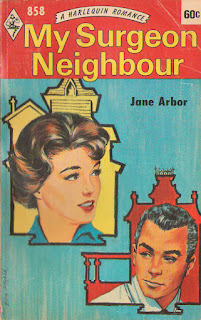Cover illustration by
Bern Smith
When Nurse Sarah
Sanstead inherited an old house in the country and decided to turn it into a
convalescent home for children, she did not guess the complications which would
ensue. Her new neighbour, the surgeon Oliver Mansbury, wanted the house as an
extension for his next-door nursing home, and did not hesitate to express his
scepticism about Sarah’s plans: “Aren’t you really only waiting to be collected
as some man’s wife, the mother of his children?” Sarah was indignant. But
little did she realize that a time would come when she would hope against hope
that she might become Oliver Mansbury’s wife and the mother of his children.
GRADE: C+
BEST QUOTES:
“Not that you don’t look just as sweet in your starch. But
I’ll say you can blossom when you like.”
“So many children are spoonfed on TV that the ones who
really prefer to get things from books appear as freaks of nature.”
“A man loves a woman quite differently from the way she
loves him, everyone knows.”
REVIEW:
“Mother of his children”? Maybe this phrase off the back
cover blurb above is meant to be a euphemism, but when I see a hot guy, the
last thing I think about is babies. Regardless, when Sarah Sanstead inherits an
enormous old house in the country, she decides to turn it into a rehab facility
for children recovering from illness. The rub is that her neighbors have turned
their house into a rehab facility for
old folks, and matron Kate of Greystones is fighting with Sarah at every turn
about it, because she had hoped to buy Sarah’s house and expand her own
facility. And those screaming kids make such a racket!
The matron’s nephew, Oliver Mansbury, is (guess) a surgeon
in the employ of Greystones; though you’d think an internist might have been a
better choice, you just can’t get good help these days. Oliver is initially opposed
to Sarah’s plans, and has a talk with her early on when she refuses his offers
to buy her out. He wants to know if she is really committed to her facility, or
is her devotion “the kind a lot of women parade as a virtue, when they’re
really only waiting to be collected as some man’s wife”? She is shocked—shocked!—by
the question, and declares that she is utterly sincere. “My job is the one
thing I want to do,” she says—but adds, “when I marry I should want that to be
the one thing I must do.” So how will she manage, he wants to know, when her
true love comes along? “When there’s just one thing that you know matters most
to you, everything else takes second
place,” she answers naively. He is skeptical, and dubious of her facility, but
in a few more pages, the place is up and running smoothly, and Oliver is easily
won over by the young lady’s hard work and dedication.
So now it’s the daily ups and downs of a house full of
children, men to go out with even though they’re really just good friends and
not boyfriends, and minor skirmishes with Matron Kate and, also, Jurice Grey, a
wealthy and shallow young woman who is hoping to become engaged to Oliver, in
part by kneecapping the competition she sees over the fence. And Sarah’s own
growing affection for Oliver, but if “the leap of her heart at sight [of] him
was too disturbingly familiar,” she is wholly unable to see that she is falling
for him. I am always irritated by this particular contrivance of the VNRN, as
it just makes our heroine seem stupid. The penny always drops eventually; “she
loved the man,” Sarah finally realizes in the penultimate chapter, which comes
as a surprise to exactly no one else. But “the realization shook her to the
core.” Ugh.
Without much fuss, Sarah and Oliver eventually find their
way to each other. But now rears its head the question of which is more
important to Sarah, her work or her man. “If I insist that marriage to me will
be a full time job,” Oliver says, will she agree to close down? Yes, she will,
“without question”—but not to worry, folks, he was just joking! “I was testing
your wifely compliance,” he explains, ha ha, and isn’t it big of him to let her
keep her business after all? Only, though, if she agrees to expand into
something much larger, an idea she has resisted mightily throughout the book. “
‘Now you are beginning to manage me too!’ she accused him happily,” because
nothing makes a lady more pleased than to be bossed around by her boyfriend.
“Who with a better right?” he answers, and all there is for them to kiss and
live happily ever after, or at least until Sarah recovers the staunch
independence of spirit that has made her facility a success up to this point.
This book is pleasant, but not much more than that. The
characters are not especially exciting, with the sole exception of bad girl
Jurice; her battles with Sarah are the only spice the story has to offer, even
if they, too, are as predictable as the rest of the book. It’s a vanilla
pudding—easy, smooth, and nice enough, but maybe not the first thing you’d
reach for, if there’s molten chocolate cake to be had. There’s not always, I’ll
grant you, so it will do in a pinch, but it’s nonetheless best left at the back
of the cupboard for a day when it’s otherwise bare.



